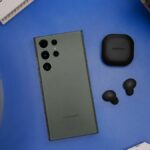
Samsung Electronics today posted its financial results for the fourth quarter of 2014, which ended on December 31st, 2014. The Korean giant posted a total revenue of KRW 52.73 trillion — an increase of over 11 percent compared to the previous quarter.
The company’s operating profit also increased in the last quarter of 2014 to KRW 5.29 trillion (US$ 4.8 billion), an increase of over 30% compared to Q3, 2014. However, when compared to the same quarter in 2013 where the company managed to pull in a profit of KRW 8.31 trillion, Samsung’s overall profit has plummeted by 36 percent on a YoY basis and by 27 percent on a quarterly basis. This was also Samsung’s fifth consecutive quarter where its profit continued to decline.
The company’s smartphone division posted KRW 26.29 trillion (US$ 24 billion) in consolidated revenue with an operating profit of KRW 1.96 trillion (US$ 1.8 billion). While the company shipped less smartphones compared to Q3, 2014, the ASP of its smartphone did increase thanks to the launch of the Galaxy S4. Additionally, improved channel inventory levels allowed the company to efficiently manage its marketing expenditure.
For 2015, Samsung expects its smartphone division to grow in emerging markets like China and India. The company is also focusing on increasing its sales, especially in the enterprise sector, through its recently unveiled Galaxy A series of products.
Through new materials, innovative design and differentiated features, competitive products will be introduced to drive smartphone sales, while efficiency will be enhanced across R&D and marketing to increase profitability.
As for tablets, Samsung will continue to focus on premium as well as low-end tablets whilst working on increasing the “product competitiveness” for sustained growth. The company will also continue its lead in the wearables market by diversifying its portfolio and releasing products with innovative new designs.
The company also evidently made it clear that it will be relying more than ever on its in-house chips and processors, which matches up perfectly with reports about the Galaxy S6 dropping the Snapdragon 810 in favor of an Exynos chipset.
[Via Samsung]





















